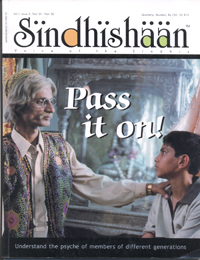SOUND RECORDS
A presentation of some recorded facts about ancient Sindhi music
The ektara also is an instrument found in the hands of a wandering fakir. Made from a simple hollow gourd, mounted on a stick to which one or two strings are attached, its function is not only to provide a drone to the voice, but also as a rhythmic accompaniment.
There are 5 genres of music that originate from the Sindh. The first is the Lada, which is traditionally sung before weddings. These are playful and celebratory songs that are sung in the respective houses of the bride and the groom. The other 4 genres of music are the Dhamal, Vai, Kafi and Doheeras all with origins in the Sufi tradition. A tradition, which draws on the theological basis of Islam and the philosophical basis of Hinduism. Traditionally music was danced and sung by wandering dervishes also called Qalandar, Malang or Fakir.
The alghoza is another typical instrument of Sindh, consisting of several reeds which make it possible to play the melody and a drone simultaneously. Other instruments that are used are the tanbura which is a simple lute, a dholak or table which is a hand manipulated drum and a harmonium.
The leading role in Sindhi music belongs to the human voice . . . . the voice is closely followed by the surando, a bowed instrument. Its haunting sound is created by many resonating strings running over a parchment covering the lower half of a strangely shaped body carved out of a single piece of wood. The upper half is left open – this serves not only as an opening for the resonance but also as a receptacle to receive the gifts that listeners may offer to a wandering musician. Closely related to a sarangi, its plaintive notes are said to come closest to the sound of the human voice.
The most famous poet of Sindh is Shah Abdul Latif who lived from 1689 to 1752 and is buried in a beautiful tomb in Bhit, although was not the first poet who used Sindhi, the common language of the people, to tell of the unity of all beings, he certainly is the one that is loved most. One of the reasons for this may be that he used the folk tales of Sindh to express the story of the human soul. It is characteristic for the popular legends of Sindh that the heroine is a woman, as in the stories of ‘Sassui Punhun’, ‘Heera Ranjha’ or ‘Sohni Mehawal.’ The loving woman is turned into a symbol of the soul, searching for the eternal beloved in spite of all hardships she may have to endure. In the mystical union, there are no boundaries between the religions as well. Shah Abdul Latif praises equally the Hindu Yogis burning in the fire of love and Islamic seekers.
MUSIC TRIVIA
Which Sindhi musical instrument did Prof. Ram Panjwani play ?
‘Dilo’ – an earthen pitcher. Also popularly known as Matka.
Who is known as the nightingale of Sindhi music?
Bhagwanti Nawani
On the occasion of marriage, what are the folk songs sung by ladies called?
Ladaas
Who is the first known Sindhi Poet?
Qazi Qazan
Which is the famous triumvirate of early Sindh Poets?
Shah, Sachal and Sami
Name the book containing poetic treasure of Shah Abdul Latif.
Shah-Jo-Rasalo
Who is considered the rebel Sindhi Sufi poet?
Sachal
Which Sindhi poet is called ‘Poet of Masses’?
Hundraj Dukhayal
Which is the most voluminous composition in Sindhi, written in verse?
Sadhu Vaswani’s ‘Noori Granth’
DID YOU KNOW
Did you know the following people are Sindhis?
-
The Great Mughal emperor Akbar (his mother Hamida Banu was Sindhi)
-
Benazir Bhutto, former prime minister of Pakistan
-
Mohammed Ali Jinnah, father of Pakistan
The following ancient texts make references to Sindhi / Sindhis as a distinct society.
-
Dhammapada – A Contemplation on the Buddhist path
-
Sadi’s Gulistan
-
The Mahabharata
When does the Sindhi New Year Begin?
On Cheti Chand
What are the names of the months in Sindhi?
Chet, Vaisakh, Jheth, Akhaar, Savan, Bado, Assoo, Katti, Nahiri, Poh, Maangh, Phagun
What was the name of the Commander of Arab Force, which conquered Sindh?
Mohamed-Bin-Qasim
In the Lok Sabha, which member of Parliament made a speech in Sindhi?
Acharya Bhagwan Dev
On behalf of Sindhis, which Sindhi lady received the title of ‘Sindhu Mata’?
Smt. Jethibai Pessumal Kalani – mother of Hemu Kalani
What is the ancient name of Sehwan?
Shiv-Isthan or Sewisthan


